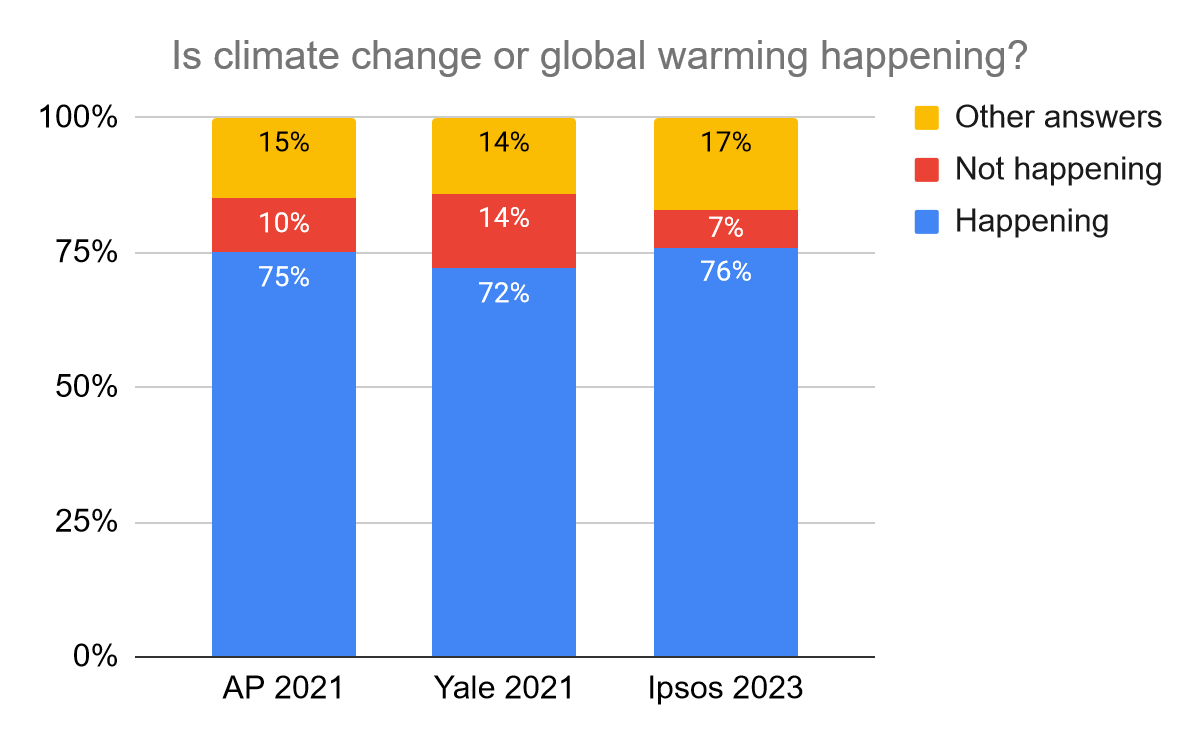Most Americans believe climate change is real
But reducing emissions is not a priority for them
Most surveys provide consistent results: a very large majority of Americans believe climate change is real and about half believe it is mostly caused by humans.
I’m considering the following surveys that are recent and seem to be of relatively high quality:
A September 2021 AP survey of 5,468 U.S. adults
A 2021 Yale Climate Opinion Maps survey of 28,000 Americans
An April 2023 Ipsos survey of 1,029 U.S. adults
Surveys consistently find that fewer than 15% of Americans don’t believe global warming or climate change are happening (red bars in the graph below):
Note that AP and Ipsos ask whether climate change is happening whereas Yale asks whether global warming is happening. I’m using the two expressions interchangeably in this post.
What is the cause of climate change? The chart below breaks down the group of people who believe climate change is happening (blue bars in previous chart) depending on what they believe is the cause. The groups “Not happening” and “Other answers” are the same as in the previous chart.
It is a bit more difficult to interpret the results from all three surveys because they don’t allow for the same answers: AP allows respondents to say climate change is equally caused by human and natural causes, and Yale allows respondents to say they believe climate change is real but don’t know the cause.
Regardless of the differences in surveys methodology, I think it is fair to conclude that about half of Americans say climate change is both happening and mostly caused by humans.
Climate change isn’t a priority for them
According to a January 2023 Pew Research Center survey of 5,152 U.S. adults, 37% say “dealing with climate change” should be a “top priority” from Congress and the President. In comparison, 75% say “strengthening economy” should be a top priority. Climate change ranks as the 17th out of 21 surveyed issues.
Also, climate change is the only issue for which at least 10% of respondents say that action “should not be done.”
Every month, the Gallup Poll Social Series asks at least 1,000 U.S. adults “What do you think is the most important problem facing the country today?” In the last seven monthly polls, between 1% and 4% of Americans (median 3%) answer “the environment, pollution or climate change.” The top two problems are “the government or poor leadership” (14-21%) and “the economy in general” (10-18%). Note that the 3% not only includes climate change but also the environment and pollution — presumably, if Gallup had asked about climate change by itself, the proportion of respondents saying climate change is the most important problem would have be lower than 3%.
Americans prefer policies that don’t have a direct cost
The conclusion of the previous section might come as a bit of a surprise. After all, haven’t you read or heard many times that most Americans support various climate policies?1 How then can climate change rank so low compared to other priorities?
A different set of survey questions highlight a simple fact — Americans support climate policies that don’t directly cost them time or money. When there is a direct cost, support plummets.
In July and August 2019, the Kaiser Family Foundation and the Washington Post surveyed 2,293 U.S. adults and asked them which “policies aimed at reducing greenhouse gas emissions in the U.S.” they support.
Policies that don’t seem to have a direct cost to most Americans, such as increasing taxes on wealthy people or on oil companies, are supported by about two thirds of Americans (shown in blue).
However, policies that have a direct cost associated with them receive lower support (shown in green). For example, 35% support increasing gas taxes by $0.10 per gallon (less than $0.03 per liter), and 25% support an increase of $0.25 per gallon. To put these numbers into context, between 2020 and 2023, U.S. average national retail gas prices have fluctuated between $2.20 and $5.10 per gallon. Even when prices spiked in late Spring 2022 following Russia’s invasion of Ukraine, monthly U.S. gasoline demand decreased at most by 6%2. In other words, few Americans are willing to increase gas prices by an amount that by itself would barely have any noticeable impact on gasoline consumption.
The Ipsos 2023 survey finds similar results: 35% are willing to pay $100 more per year ($8 per month) in taxes and 31% are support the same increase in their electricity bills.
An April 2023 Yale survey asks 861 U.S. registered voters which policies to address climate change they support. Almost all policies are popular. For instance, 82% support “providing federal funding to help farmers improve practices to protect and restore the soil so it absorbs more carbon” and 79% support “funding more research into renewable energy sources.” One of the policies that has the lowest approval is “requiring electric utilities to produce 100% of their electricity from renewable energy sources by 2035” at 66%. Contrary to the Kaiser survey, no policies that directly cost people money are considered.
Americans say that others should do more to address global warming
The 2023 Yale survey also asks whether different groups should do more to address global warming.
When asked whether “you personally” should do much more, 8% say yes. The proportion increases to 23% when asked whether “citizens themselves” should do much more. Either the survey is not representative of U.S. registered voters3, people overestimate how much they do compared to their fellow citizens, or both.
The top three groups that should do much more are the U.S. Congress (35%), the Republican Party (39%) and corporations and industry (42%).
The 2019 Kaiser survey reached similar conclusions. Three of the top four political actors who are doing too little are identical. According to this poll, the top political actor who does too little to reduce greenhouse gas emissions is the Chinese government.
There is a much higher willingness to ask others to do more about climate change.
Few Americans volunteer their time or money to address climate change
When asked whether they would get personally involved and spend their time and money to reduce global warming, support falls. Only about a third of respondents have the intention to spend their own money or volunteer their own time. When asked about what they have actually done, these numbers plummets. For instance, 12% gave money at least once during the last year (17% did the same at least once in the past three years), and only 5% volunteered their time in the past year (9% in the past three years).
The Ipsos 2023 survey also asks respondents what they are willing to do to limit climate change. About a third are willing to change their behavior depending on the solution considered — 36% are willing to walk or bike, 30% to install solar panels, 25% to trade in an ICE vehicle for an EV, and 21% to use transit.
Summary
Recent surveys of U.S. adults are consistent enough to draw the following conclusions about their beliefs, attitudes and behaviors towards climate change and climate policies:
The vast majority of Americans believe climate change is real — fewer than 15% say they don’t think it’s real
About half of Americans believe climate change is real and caused by humans
Most Americans support climate policies that don’t have a direct cost, and about a third support policies that have a direct cost
About a third of Americans say they are willing to volunteer some of their time and money to address climate change, and fewer actually do so
In future posts we’ll look at some implications of these beliefs and attitudes.
The 2021 Yale survey’s accompanying slide deck concludes “There is widespread support for policies that reduce carbon emissions and improve sustainability.”
EIA’s Monthly Energy Review, Table 3.5 Petroleum products supplied by type (thousands barrels per day). When comparing 2022 to 2021, the biggest monthly drop of motor gasoline occurred between July 2021 (9,297,000 bpd) and July 2022 (8,750,000 bpd).
49% of participants are Democrats and 36% are Republicans.











Very nice analysis of attitudes towards climate change. Of course, even if reducing GHG is not a priority for most (37%), an organized political group can force policies through. The 10% saying no action should be done on climate change seems to fit in well with those who say it isn't happening.
Climate change is a problem, but humanity also has much bigger problems to worry about. https://zerocontradictions.net/civilization/climate-change